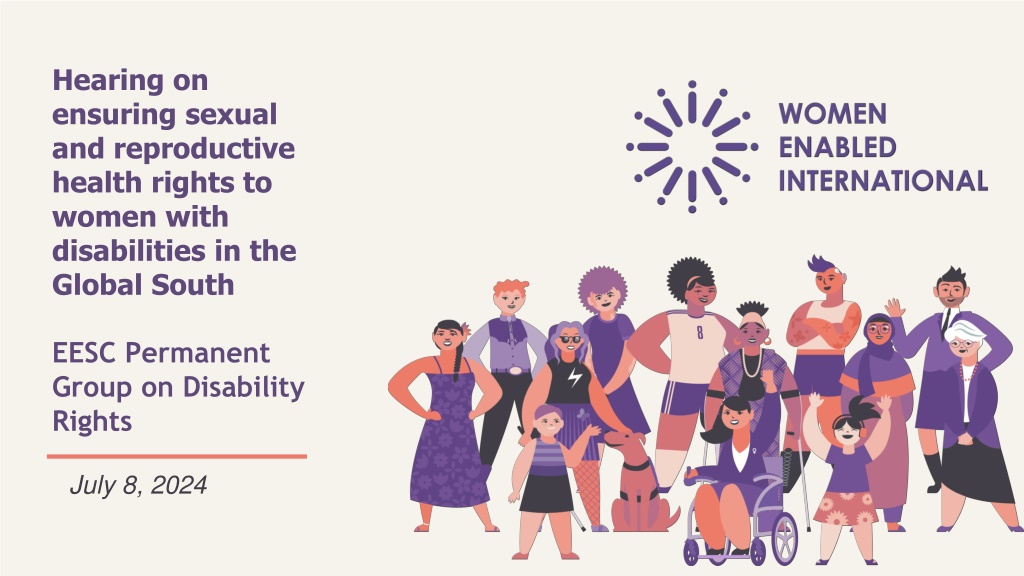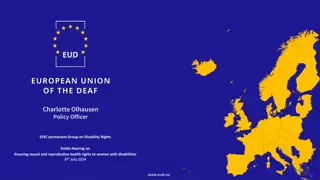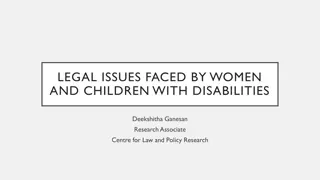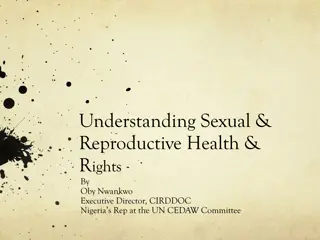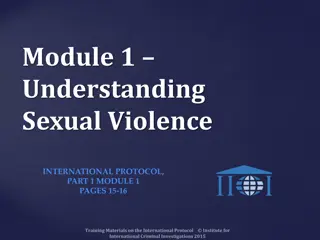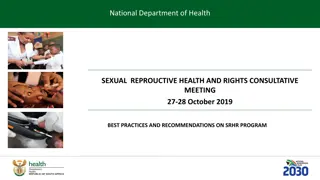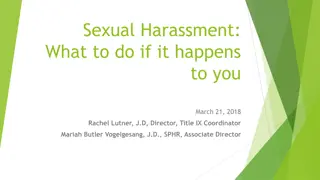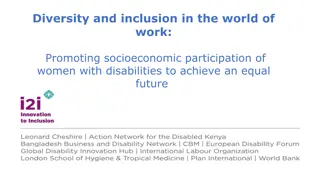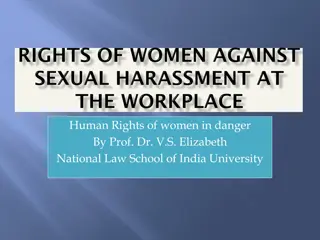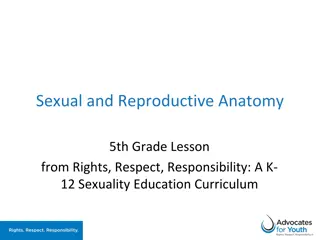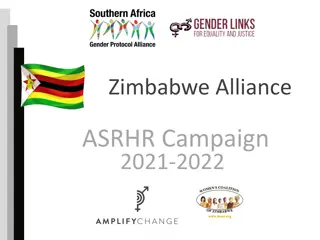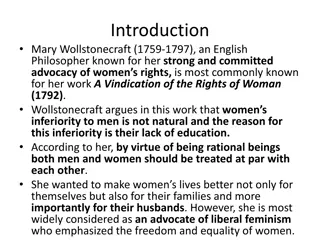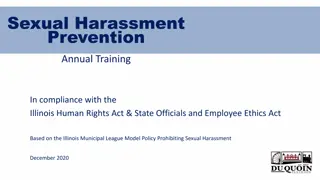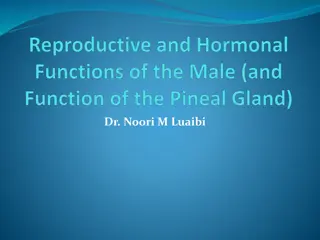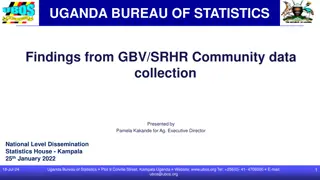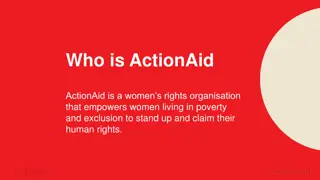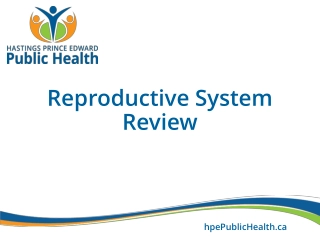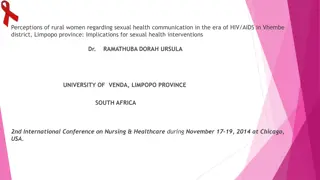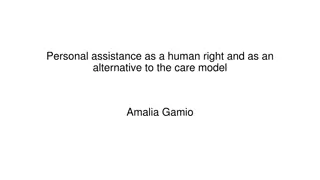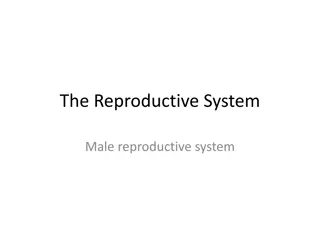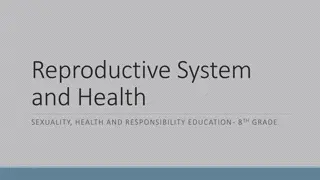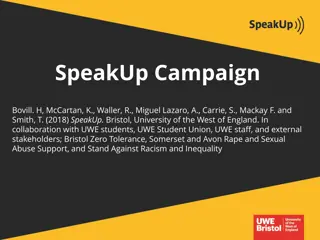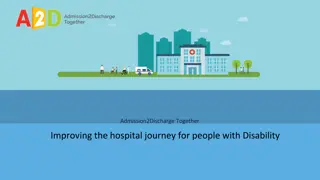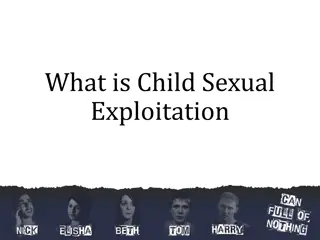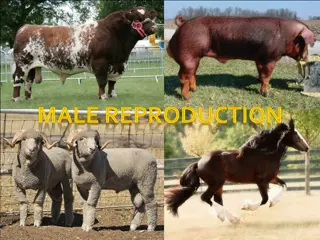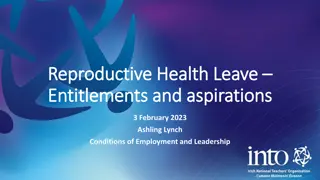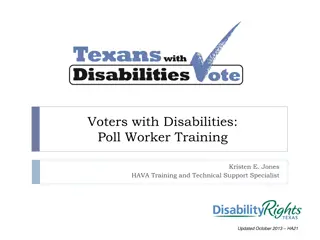Challenges in Ensuring Sexual and Reproductive Health Rights for Women with Disabilities in the Global South
Women with disabilities in the Global South face barriers such as lack of information, inaccessible services, and denial of bodily autonomy in accessing sexual and reproductive health rights. Initiatives like the Community-Based SRH Officers Programme aim to empower individuals with disabilities to advocate for their rights. The denial of bodily autonomy, including forced sterilizations and decisions made without consent, further exacerbates the challenges faced by these women.
Uploaded on Sep 26, 2024 | 0 Views
Download Presentation

Please find below an Image/Link to download the presentation.
The content on the website is provided AS IS for your information and personal use only. It may not be sold, licensed, or shared on other websites without obtaining consent from the author. Download presentation by click this link. If you encounter any issues during the download, it is possible that the publisher has removed the file from their server.
E N D
Presentation Transcript
Hearing on ensuring sexual and reproductive health rights to women with disabilities in the Global South EESC Permanent Group on Disability Rights July 8, 2024
Women Enabled International Led by feminists with disabilities and allies, WEI is a global non-profit organization that works to advance human rights and justice at the intersection of gender and disability to challenge exclusionary, unjust systems, and support the leadership of women, girls, and gender-diverse people with disabilities around the world. New Strategic Plan
Women with disabilities in the Global South and access to SRHR Challenges Lack of information and accessible services, Denial of bodily autonomy, and SRHR in the context of humanitarian crises Leadership of women and gender-diverse persons with disabilities
Lack of access to SRH information and services Lack of accessible medical equipment and facilities Example: Vanuatu less than 15 percent of the healthcare facilities had ramps, and examination rooms or bathrooms with wheelchair access Lack of accessible information Example: Vanuatu accessible information available in less than 4% of facilities Attitudinal barriers
Community-Based SRH Officers Programme Partners: Fijian Ministry of Health and Medical Services, UNFPA Pacific, the Pacific Disability Forum, the Fiji Disabled People s Federation, and Medical Services Pacific Goal: train people with disabilities to act as community-based health officers to fill the gap in this access to information and services. The program seeks to increase knowledge and expand access to SRH services for women and young people with and without disabilities in Fiji. 127 participants attended the trainings, and over 80% reported that they felt more empowered to exercise their sexual and reproductive rights and request services following the sessions.
Denial of bodily autonomy Women with disabilities regularly experience forced or coerced sterilizations, contraception and abortion at higher rates than women without disabilities Decisions made by substituted decisionmakers, like parents, doctors, and other actors, without the informed consent of the individual Example: Fiji
Denial of bodily autonomy: the right to abortion 2023: OPDs from across the LAC region joined forces to submit an amicus brief to the Inter-American Court of Justice on the case Beatriz vs. El Salvador: women and other persons with and without disabilities have the right to access legal, safe and quality abortion services, particularly when pregnancy poses a risk to their life and health, and that States, including El Salvador, should take effective measures to eliminate stigma and discrimination against persons with disabilities without affecting the fundamental human rights of women and other persons with the capacity to become pregnant and, in particular, without impeding their access to legal, safe and quality abortion services.
Women with disabilities and access to SRHR in humanitarian crises Humanitarian crises disproportionately impact the lives of women, girls, and gender-diverse people with disabilities, including on the SRHR of those living in the Global South. Example: Gaza women and girls with disabilities have lost access to appropriate sanitation facilities which impacts their menstrual health as well as their access to SRH services, safe and accessible shelter, and, crucially, food and water to survive. Heightened vulnerability to sexual abuse and GBV Impacts replicated in other situations of crises such as the COVID-19 pandemic and natural disasters
Recommendations Ensure disability-inclusive SRH services are available to all women and gender diverse people with disabilities and that they are accessible, acceptable and of good quality Develop disability-inclusive and accessible information specifically targeting women and gender diverse people with disabilities to improve their awareness about SRHR Train healthcare providers a to provide information on SRH in a manner that is gender- and disability-inclusive, as well as culturally sensitive. Abolish systems of guardianship and ensure supported decision-making for persons with disabilities, including in the context of SRH.
Recommendations Center the realities of women, girls, and gender-diverse people with disabilities in all efforts around humanitarian crises and ensure human rights at the intersection of gender and disability at all times. Specifically: - Ensure that women, girls, and gender diverse with disabilities are provided direct access to food, water, medical supplies, healthcare, evacuation assistance, accessible transportation, safe and accessible shelters, and other measures to reduce the impact of the conflict on their lives. - Ensure that women, girls, and gender diverse people with disabilities have access to sexual and reproductive goods, such as sanitary pads and contraceptive pills, and essential SRH care, such as maternal healthcare and GBV services. - Prevent and redress sexual and gender-based violence against women, girls, and gender diverse people with disabilities, including by evacuating and ensuring that they can flee humanitarian crises areas, ensuring that humanitarian assistance is directly accessible to them and is disability- and gender-responsive, - Ensure that women, girls, and gender diverse people with disabilities have access to information about humanitarian assistance and about response to GBV and SRH during crises, provided in accessible formats.
